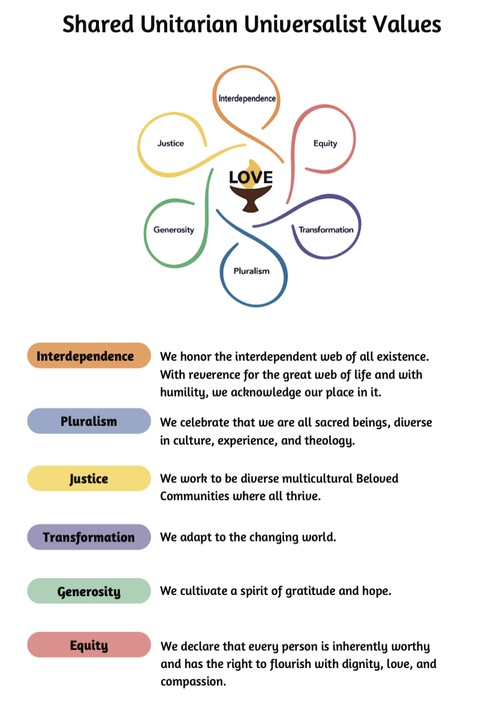About Unitarian Universalism
Unitarian Universalism offers diverse ways of connecting with the sacred
By welcoming the wisdom found in many scriptures, we share a “living tradition” of wisdom and spirituality. UUs hold moral values—not dogma or doctrine. You need not renounce your current beliefs to take part in our services.

What is a UU?
With its historical roots in the Jewish and Christian traditions, Unitarian Universalism is a liberal religion -- that is, a religion that keeps an open mind to the religious questions people have struggled with in all times and places. We believe that personal experience, conscience and reason should be the final authorities in religion, and that in the end religious authority lies not in a book or person or institution, but in ourselves. We are a non-creedal religion: that is, we do not ask anyone to accept one Truth or subscribe to a common set of beliefs.
Theologically, UU ministers are as diverse as Unitarian Universalism—among our ministers you will find a variety of spiritualities and many different beliefs about the sacred.
Our congregations are self-governing. Authority and responsibility are vested in the membership of the congregation. Worship is held regularly, the insights of the past and the present are shared with those who will create the future, service to the community is undertaken, and friendships are made.
Theologically, UU ministers are as diverse as Unitarian Universalism—among our ministers you will find a variety of spiritualities and many different beliefs about the sacred.
Our congregations are self-governing. Authority and responsibility are vested in the membership of the congregation. Worship is held regularly, the insights of the past and the present are shared with those who will create the future, service to the community is undertaken, and friendships are made.


UU Principles and Sources
Member congregations of the Unitarian Universalist Association share a covenant to affirm and promote principles that are expressed through a set of inseparable and deeply interdependent shared values. These values are a guide, not dogma or doctrine.
Unitarian Universalism is a living tradition that has changed in many ways from the original Christian roots of its Universalist and Unitarian heritages, and it continues to evolve today. The process of review and revision is mandated by UUA bylaws to happen every 15 years, and the language describing Unitarian Universalist faith has changed multiple times over the course of our history.
In June 2024, after a multi-year process of discernment and discussion, UUs voted to replace the existing 'Seven Principles and Six Sources' language in our bylaws with language describing Unitarian Universalism through these shared values:
Unitarian Universalism is a living tradition that has changed in many ways from the original Christian roots of its Universalist and Unitarian heritages, and it continues to evolve today. The process of review and revision is mandated by UUA bylaws to happen every 15 years, and the language describing Unitarian Universalist faith has changed multiple times over the course of our history.
In June 2024, after a multi-year process of discernment and discussion, UUs voted to replace the existing 'Seven Principles and Six Sources' language in our bylaws with language describing Unitarian Universalism through these shared values:
- Interdependence: We honor the interdependent web of all existence and acknowledge our place in it.
- Pluralism: We are all sacred beings, diverse in culture, experience, and theology.
- Justice: We work to be diverse multicultural Beloved Communities where all feel welcome and can thrive.
- Transformation: We adapt to the changing world.
- Generosity: We cultivate a spirit of gratitude and hope.
- Equity: We declare that every person is inherently worthy and has the right to flourish with dignity, love, and compassion.
Inspirations:
Direct experiences of transcending mystery and wonder are primary sources of Unitarian Universalist inspiration. These experiences open our hearts, renew our spirits, and transform our lives. We draw upon, and are inspired by, sacred, secular, and scientific understandings that help us make meaning and live into our values. These sources ground us and sustain us in ordinary, difficult, and joyous times. We respect the histories, contexts, and cultures in which these sources were created and are currently practiced. Grateful for the experiences that move us, aware of the religious ancestries we inherit, and enlivened by the diversity which enriches our faith, we are called to ever deepen and expand our wisdom.
Inclusion:
Systems of power, privilege, and oppression have traditionally created barriers for persons and groups with particular identities, ages, abilities, and histories. We pledge to replace such barriers with ever-widening circles of solidarity and mutual respect. We strive to be an Association of congregations that truly welcome all persons who share our values. We commit to being an Association of congregations that empowers and enhances everyone’s participation, especially those with historically marginalized identities.
Freedom of Belief:
Congregational freedom and the individual’s right of conscience are central to our Unitarian Universalist heritage. Congregations may establish statements of purpose, covenants, and bonds of union so long as they do not require that members adhere to a particular creed.
